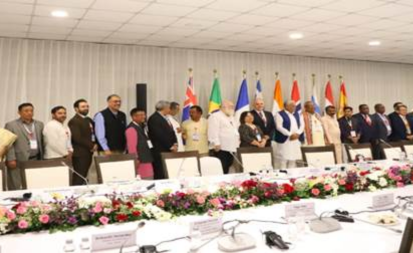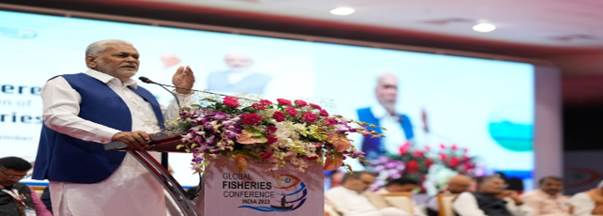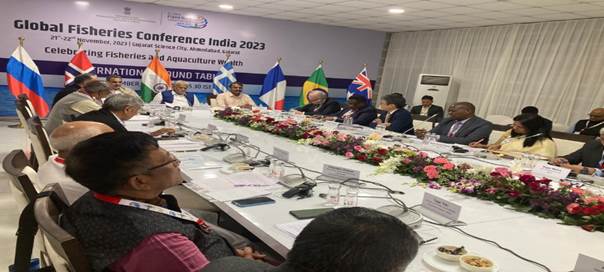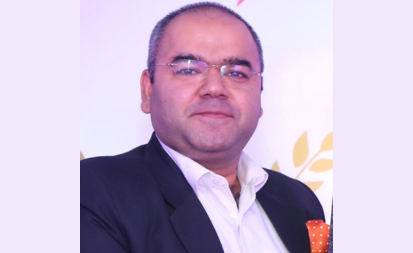Global Fisheries Conference India 2023 successfully conclude at Ahmedabad: participation in physical and online modes made conference a grand success
Technology innovation and adoption key for boosting start-up and entrepreneurial ecosystem in fisheries sector The Global Fisheries Conference India 2023 concluded on Wednesday at Ahmedabad with a call for more technological innovations and adoption to boost

Technology innovation and adoption key for boosting start-up and entrepreneurial ecosystem in fisheries sector
The Global Fisheries Conference India 2023 concluded on Wednesday at Ahmedabad with a call for more technological innovations and adoption to boost the start-up and entrepreneurial ecosystem in the fisheries sector of the country.

While interacting with the media, Union Minister for Fisheries, Animal Husbandry &Dairying Shri Parshottam Rupala thanked the Government of Gujarat for extending support in organising the event at Ahmedabad in an exceptional way. He also conveyed thanks to the fishermen community and other delegates for their participation in the conference.
Union Minister Shri Parshottam Rupala said this is the first time the Department of Fisheries, GoI, has organised the Global Fisheries Conference bringing together foreign delegations, international organisations, entrepreneurs and other stakeholders.
The two-day conference, that witnessed an impressive footfall of over 14,000 physical and virtual participants, brought together a diverse array of dignitaries and stakeholders including state fisheries ministers, ambassadors and diplomatic delegations from different nations, global fisheries scientists, policy makers, fisheries communities and investment bankers.
The conference featured a comprehensive agenda, comprising five technical sessions, five industry connections, and five Government-to-Government (G2G), Government-to-Business (G2B) and Business-to-Business (B2B) sessions.

An exhibition was organised during conference that featured participation of start-ups, fishermen, food stalls, demonstration of aquariums, Artificial reefs, Seaweed Cultivation, capture fisheries, marine cage culture, biofloc, RAS, fish feed, LPG converter kits, pearl extraction and nucleus implantation, model of Setcom satellite terminals communication system, eco-friendly movable kiosks, multi-species hatchery etc.As the event successfully concluded yesterday, participants in physical and online modes made the conference a grand success.
Industry Connect Sessions
The Industry Connect session that brought together industry leaders, policymakers, entrepreneurs and experts, identified critical challenges and opportunities being faced by the sector. It called for the need for innovation, technology adoption, gender sensitivity and collaborative initiatives to drive sustainable growth in the industry.
The session explored the evolving landscape of the fisheries sector, with discussions ranging from role of start-ups, involvement of women in fisheries value chain, importance of cold chain in fisheries post-harvest management and the transformative role of technology.
Speakers at the session on ‘Role of Start-ups in Fisheries and Aquaculture’ emphasised the importance of developing easy-to-use and economical products and solutions to address the challenges faced by farmers. Slow technology adoption, lack of investment, inadequate marketing and technical support are some of the constraints in the industry. Collaboration among start-ups with complementary services was also identified as a key strategy for long-term sustainability in the sector.

Women continue to be undervalued and underpaid
Despite their substantial contributions to post-harvest activities in the fisheries sector, women continue to be undervalued and underpaid, according to the Industry Connect session on “Involvement of Women in Fisheries Value Chain”.
The session also flagged some of the challenges, absence of social frameworks, lack of gender sensitivity and low awareness are some of the challenges being faced by women in the sector. Solutions proposed included hand-holding initiatives, capacity building programs, awareness generation campaigns and financial assistance. The importance of resilience and consistency was emphasized to encourage women to take on larger roles in the fisheries value chain and sector.
The session on ‘Importance of Cold Chain in Fisheries Post-Harvest Management’ highlighted the critical role of cold chain management in minimizing post-harvest losses and enhancing the quality and safety of fish products throughout the fisheries supply chain.
ARS, CE, NFDB, Hyderabad Dr. L. Narasimha Murthy chaired the session featured a panel of experts who delved into the importance of cold chain infrastructure, state-wise studies to assess losses and the need for policy interventions.
Lead speakers emphasized the urgency of addressing post-harvest losses, which contribute significantly to income loss and protein wastage. They underscored the requirement for energy-efficient solutions, uniform policies and collaborations for clean refrigeration technologies.
The panel underscored the importance of quality across the value chain, urging innovations in active cooling systems while emphasizing on the significance of preserving fish quality for both domestic consumption and exports.
Overall, the session called for concerted efforts to upgrade the cold chain infrastructure and practices in the fisheries sector to minimize losses, enhance product quality, and ensure the continued availability of safe and nutritious seafood for consumers worldwide.
—-
 English
English French
French German
German Italian
Italian



